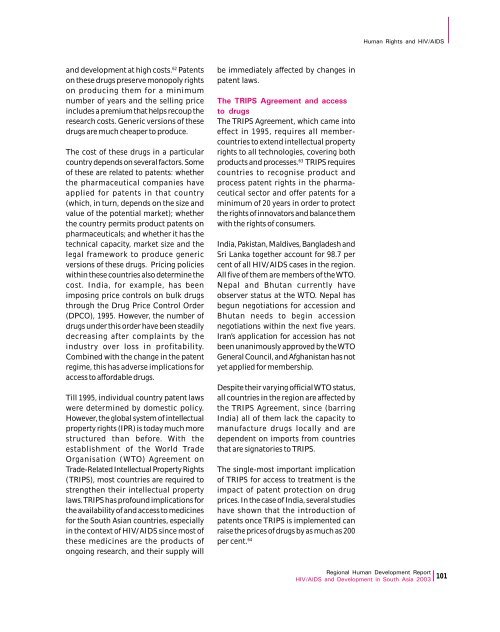Download Report - UNDP Asia-Pacific Regional Centre - United ...
Download Report - UNDP Asia-Pacific Regional Centre - United ...
Download Report - UNDP Asia-Pacific Regional Centre - United ...
You also want an ePaper? Increase the reach of your titles
YUMPU automatically turns print PDFs into web optimized ePapers that Google loves.
Human Rights and HIV/AIDSand development at high costs. 62 Patentson these drugs preserve monopoly rightson producing them for a minimumnumber of years and the selling priceincludes a premium that helps recoup theresearch costs. Generic versions of thesedrugs are much cheaper to produce.The cost of these drugs in a particularcountry depends on several factors. Someof these are related to patents: whetherthe pharmaceutical companies haveapplied for patents in that country(which, in turn, depends on the size andvalue of the potential market); whetherthe country permits product patents onpharmaceuticals; and whether it has thetechnical capacity, market size and thelegal framework to produce genericversions of these drugs. Pricing policieswithin these countries also determine thecost. India, for example, has beenimposing price controls on bulk drugsthrough the Drug Price Control Order(DPCO), 1995. However, the number ofdrugs under this order have been steadilydecreasing after complaints by theindustry over loss in profitability.Combined with the change in the patentregime, this has adverse implications foraccess to affordable drugs.Till 1995, individual country patent lawswere determined by domestic policy.However, the global system of intellectualproperty rights (IPR) is today much morestructured than before. With theestablishment of the World TradeOrganisation (WTO) Agreement onTrade-Related Intellectual Property Rights(TRIPS), most countries are required tostrengthen their intellectual propertylaws. TRIPS has profound implications forthe availability of and access to medicinesfor the South <strong>Asia</strong>n countries, especiallyin the context of HIV/AIDS since most ofthese medicines are the products ofongoing research, and their supply willbe immediately affected by changes inpatent laws.The TRIPS Agreement and accessto drugsThe TRIPS Agreement, which came intoeffect in 1995, requires all membercountriesto extend intellectual propertyrights to all technologies, covering bothproducts and processes. 63 TRIPS requirescountries to recognise product andprocess patent rights in the pharmaceuticalsector and offer patents for aminimum of 20 years in order to protectthe rights of innovators and balance themwith the rights of consumers.India, Pakistan, Maldives, Bangladesh andSri Lanka together account for 98.7 percent of all HIV/AIDS cases in the region.All five of them are members of the WTO.Nepal and Bhutan currently haveobserver status at the WTO. Nepal hasbegun negotiations for accession andBhutan needs to begin accessionnegotiations within the next five years.Iran’s application for accession has notbeen unanimously approved by the WTOGeneral Council, and Afghanistan has notyet applied for membership.Despite their varying official WTO status,all countries in the region are affected bythe TRIPS Agreement, since (barringIndia) all of them lack the capacity tomanufacture drugs locally and aredependent on imports from countriesthat are signatories to TRIPS.The single-most important implicationof TRIPS for access to treatment is theimpact of patent protection on drugprices. In the case of India, several studieshave shown that the introduction ofpatents once TRIPS is implemented canraise the prices of drugs by as much as 200per cent. 64<strong>Regional</strong> Human Development <strong>Report</strong>HIV/AIDS and Development in South <strong>Asia</strong> 2003 101
















